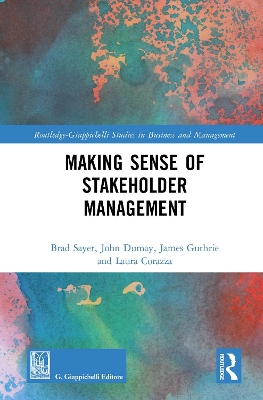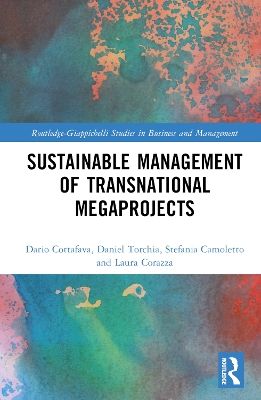Routledge-Giappichelli Studies in Business and Management
2 total works
Making Sense of Stakeholder Management
by Brad Sayer, John Dumay, James Guthrie, and Laura Corazza
Drawing back on the ever-evolving stakeholder management theory, this book responds to calls for more empirical research into the managerial sense making of the stakeholder concept.
The book explores how managers make sense of stakeholder management, especially in complex and challenging business contexts. Therefore, this book contributes to the advancement of the managerial branch of the stakeholder management theory focussing on managers’ sense making intended as how they interpret and understand social interactions.
With this book, the authors offer a contribution grounded on the what, why, when, who and how of stakeholder management, which are questions that still arouse considerable interest not only between academics, but also among practitioners.
Sustainable Management of Transnational Megaprojects
by Dario Cottafava, Daniel Torchia, Stefania Camoletto, and Laura Corazza
This book analyses the seminal role of megaprojects for sustainable development, and the related, complex challenges they bring. It provides insights into the growing social responsibilities that megaprojects have, not only to be environmentally sustainable, but also towards the multitude of stakeholders involved, whether directly or indirectly.
After an historical overview of the increasingly necessary links between sustainable infrastructure and megaprojects, the book builds on and applies stakeholder theory to stakeholder engagement and management in megaprojects. It also emphasizes the importance of building impact assessment frameworks that consider the unheard voices that are often passively sitting at the receiving end of a megaproject, as well as the local context where the megaproject is embedded.
The book then proceeds to analyse the case of a very contested transnational railway megaproject between Italy and France, the Turin-Lyon high-speed railway, which has been suffering from stakeholder and communication issues for over thirty years, as well as from notable managerial and legal differences in the two countries. In this way, the book informs both theory and practice and encourages scholarly interventions into wicked problems. It contains a comprehensive review of the academic literature on the sustainability, sustainability challenges, and sustainability reporting of megaprojects. Conceptual models, frameworks and future research opportunities are provided to clarify the empirical challenges and highlight the gaps and opportunities to be explored by researchers and practitioners in future.
The audience for the book is both academic researchers and practitioners in the field of megaprojects and more specifically, those dealing with managing transnational megaprojects. It also includes several topics that will be of interest to policy and decision-makers.

